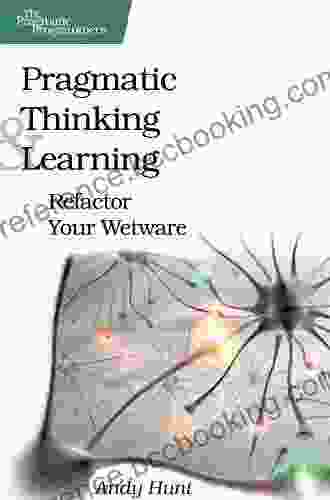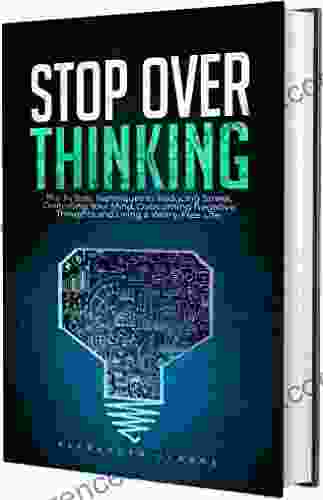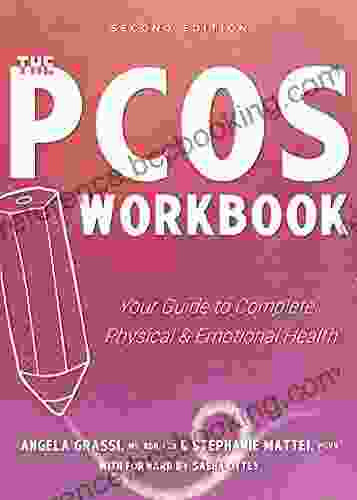Pragmatic Thinking and Learning: A Comprehensive Guide to Making Wise Decisions and Achieving Success

In today's fast-paced and ever-changing world, making wise decisions and achieving success requires a pragmatic approach to thinking and learning. Pragmatic thinking involves using evidence and logic to make decisions that are practical and effective, while pragmatic learning focuses on acquiring knowledge and skills that can be applied to real-world situations. This comprehensive guide will explore the principles of pragmatic thinking and learning, providing readers with the tools they need to make better decisions, solve problems, and achieve their goals.
The first chapter introduces the core principles of pragmatic thinking, including:
- Evidence-Based Reasoning: Making decisions based on facts, data, and logical arguments rather than emotions or biases.
- Objective Analysis: Evaluating information objectively, considering both the pros and cons of different options without personal preferences.
- Problem-Solving Orientation: Focusing on identifying and solving problems effectively, breaking down complex issues into manageable steps.
- Practicality and Effectiveness: Prioritizing actions that are most likely to produce desired outcomes and avoid unnecessary risks.
- Cognitive Flexibility: Adapting thinking to changing circumstances, considering multiple perspectives, and being open to new ideas.
Chapter 2 demonstrates how pragmatic thinking can be applied to various real-world situations, such as:
4.4 out of 5
| Language | : | English |
| File size | : | 3155 KB |
| Text-to-Speech | : | Enabled |
| Screen Reader | : | Supported |
| Enhanced typesetting | : | Enabled |
| Word Wise | : | Enabled |
| Print length | : | 252 pages |
- Decision Making: Making informed choices in personal, professional, and financial matters, weighing potential outcomes and risks.
- Problem Solving: Identifying the root causes of problems, developing creative solutions, and evaluating their effectiveness.
- Communication: Communicating effectively with others, presenting ideas clearly and logically, and listening to opposing viewpoints.
- Career Advancement: Developing a career strategy based on skills, interests, and market demand, and making wise decisions about career paths.
- Personal Growth: Setting realistic goals for personal development, identifying areas for improvement, and taking pragmatic steps towards achieving them.
Chapter 3 delves into the science of learning, exploring how the brain processes and retains information. Readers will discover:
- Memory and Retrieval: The different types of memory and how to enhance memory retention and recall.
- Cognitive Load Theory: Understanding the limits of working memory and how to optimize learning by managing cognitive load.
- Active Learning: Engaging in activities that promote active processing of information, such as questioning, problem-solving, and discussing.
- Metacognition: Becoming aware of one's own learning processes and strategies, and developing effective learning techniques.
Chapter 4 provides practical strategies for applying pragmatic learning principles to enhance knowledge acquisition and skill development. These strategies include:
- Goal Setting and Planning: Setting specific, measurable, achievable, relevant, and time-bound learning goals.
- Chunking and Spaced Repetition: Breaking down large amounts of information into smaller units and reviewing them over time to improve retention.
- Self-Testing and Feedback: Regularly testing oneself on learned material and seeking feedback to identify areas for improvement.
- Elaboration and Meaningful Connections: Linking new information to existing knowledge and making it personally relevant.
- Experiential Learning: Applying knowledge and skills in real-world settings to enhance understanding and retention.
Chapter 5 explores how pragmatic thinking and learning are essential for workplace success. Readers will learn how to:
- Solve Business Problems: Apply pragmatic thinking principles to identify and solve complex business challenges, develop innovative solutions, and implement effective strategies.
- Make Data-Driven Decisions: Analyze data to make informed decisions, identify trends, and predict future outcomes.
- Lead and Manage Effectively: Apply pragmatic thinking to lead teams, motivate employees, and create a positive and productive work environment.
- Communicate Effectively: Communicate complex ideas clearly and persuasively, and foster effective collaboration among colleagues.
- Adapt to Change: Embrace change and develop the agility to navigate changing business landscapes, learn new skills, and seize new opportunities.
Chapter 6 demonstrates the power of pragmatic thinking and learning for personal success. Readers will discover how to:
- Manage Finances Wisely: Make sound financial decisions, plan for the future, and achieve financial freedom.
- Improve Relationships: Apply pragmatic thinking to understand perspectives, resolve conflicts, and build strong relationships.
- Set and Achieve Goals: Set realistic goals, develop action plans, and overcome obstacles to achieve personal milestones.
- Develop a Growth Mindset: Embrace challenges, learn from mistakes, and continuously seek opportunities for personal growth.
- Live a Meaningful Life: Apply pragmatic thinking to define personal values, identify meaningful pursuits, and create a fulfilling life.
"Pragmatic Thinking and Learning" is an invaluable resource for anyone seeking to make better decisions, solve problems, and achieve success in both personal and professional life. By embracing the principles of evidence-based reasoning, objective analysis, and practical problem-solving, readers can develop a pragmatic mindset that will empower them to navigate the challenges of a rapidly changing world and achieve their full potential. Whether you are a student, a professional, or an individual seeking personal growth, this comprehensive guide will provide you with the tools and strategies you need to become a pragmatic thinker and learner and unlock your potential for success.
4.4 out of 5
| Language | : | English |
| File size | : | 3155 KB |
| Text-to-Speech | : | Enabled |
| Screen Reader | : | Supported |
| Enhanced typesetting | : | Enabled |
| Word Wise | : | Enabled |
| Print length | : | 252 pages |
Do you want to contribute by writing guest posts on this blog?
Please contact us and send us a resume of previous articles that you have written.
 Book
Book Novel
Novel Page
Page Chapter
Chapter Text
Text Story
Story Genre
Genre Reader
Reader Library
Library Paperback
Paperback E-book
E-book Magazine
Magazine Newspaper
Newspaper Paragraph
Paragraph Sentence
Sentence Bookmark
Bookmark Shelf
Shelf Glossary
Glossary Bibliography
Bibliography Foreword
Foreword Preface
Preface Synopsis
Synopsis Annotation
Annotation Footnote
Footnote Manuscript
Manuscript Scroll
Scroll Codex
Codex Tome
Tome Bestseller
Bestseller Classics
Classics Library card
Library card Narrative
Narrative Biography
Biography Autobiography
Autobiography Memoir
Memoir Reference
Reference Encyclopedia
Encyclopedia Angelos Mavros
Angelos Mavros Andrew Gennett
Andrew Gennett Alex Wade
Alex Wade Andrea Gonzales
Andrea Gonzales Andrew Park
Andrew Park Amy Cook
Amy Cook Amanda Vickery
Amanda Vickery Angela Carter
Angela Carter Alyssa Campbell
Alyssa Campbell Alfred Bester
Alfred Bester Alexander Monro
Alexander Monro Amanda Owen
Amanda Owen Andy Paul
Andy Paul Alex White
Alex White Amber Glover
Amber Glover Ange Zhang
Ange Zhang Amy Gaines
Amy Gaines Andrew Harding
Andrew Harding Angela Ardis
Angela Ardis Angela Garbes
Angela Garbes
Light bulbAdvertise smarter! Our strategic ad space ensures maximum exposure. Reserve your spot today!
 Bill GrantFollow ·2.2k
Bill GrantFollow ·2.2k Terence NelsonFollow ·8.5k
Terence NelsonFollow ·8.5k Terry BellFollow ·12.6k
Terry BellFollow ·12.6k Andres CarterFollow ·13.5k
Andres CarterFollow ·13.5k Billy PetersonFollow ·18k
Billy PetersonFollow ·18k Louis HayesFollow ·15.1k
Louis HayesFollow ·15.1k Jeremy CookFollow ·7k
Jeremy CookFollow ·7k Clinton ReedFollow ·7.6k
Clinton ReedFollow ·7.6k

 Julio Cortázar
Julio CortázarIf You Don't Do Politics, Politics Will Do You
Uncover the Hidden Power in Everyday Life In...

 Ivan Turner
Ivan TurnerThe Edge of Physics: Unraveling the Extraordinary...
What is the nature of...
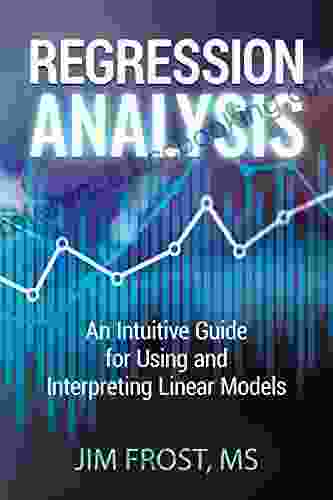
 Diego Blair
Diego BlairAn Intuitive Guide For Using And Interpreting Linear...
Linear models...
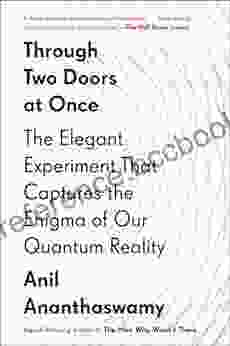
 Oscar Wilde
Oscar WildeThrough Two Doors At Once: Unveiling the Enigmatic World...
Prepare to delve into the captivating realm of...

 Darrell Powell
Darrell PowellWomen Athletes in History: An Inspiring Gift for Teenage...
Unveiling the Extraordinary Stories of Female...
4.4 out of 5
| Language | : | English |
| File size | : | 3155 KB |
| Text-to-Speech | : | Enabled |
| Screen Reader | : | Supported |
| Enhanced typesetting | : | Enabled |
| Word Wise | : | Enabled |
| Print length | : | 252 pages |


